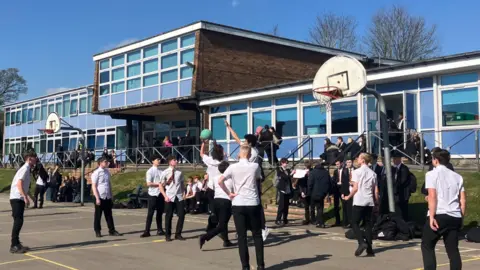A third of teachers reported misogyny among pupils last week, survey suggests
 BBC News / Kate McGough
BBC News / Kate McGoughMore than a third of secondary teachers have reported misogynistic behaviour from pupils at their school in the last week, a survey commissioned by BBC News suggests.
About 40% of the teachers who responded also said they felt ill-equipped to handle such conduct.
The BBC asked 6,000 secondary teachers about their experiences of misogyny in the classroom, using the survey tool Teacher Tapp.
The government says it has published guidance for teachers on dealing with extreme ideologies and will protect children online.
It comes as teachers and parents say they are increasingly worried about the misogynistic and violent content that children - especially boys - are being exposed to online.
Misogyny can take many forms, but is commonly characterised as prejudice against or objectification of women.
Beacon Hill Academy, a secondary school in Dudley, has a "zero tolerance" approach to derogatory language in the classroom, and takes tough action before it leads to more serious behaviour.
Head teacher Sukhjot Dhami says the Netflix drama Adolescence has raised awareness among parents, but misogynistic views in schools "have always been there".
"We've always combated those views, and we've always worked with young people - and that's the same for racist views and homophobic views," he says.
After Adolescence aired, Mr Dhami sent a letter to Beacon Hill parents explaining some of the emojis used by incels, or "involuntary celibates" - a type of misogynistic online culture - and a guide to some of the language to look out for. He says he's "extremely worried" about the access young people now have to spaces online where hate is normalised.
"We've done parental sessions in school," he says, "and we're emphasising to parents that they really have to get control of what their child is seeing and doing at home."
 BBC News / Kate McGough
BBC News / Kate McGoughBeacon Hill Academy uses data gathered in classrooms to identify safeguarding issues early. If a pupil says something sexist in class, or types something offensive on a school computer, it will be logged so the school has a joined-up view of the pupil's behaviour. The safeguarding team can then intervene before a more serious incident happens.
Year 10 pupil Adam, 14, says he was negatively affected by online videos promoting harmful ideologies which he would see every day - and which still pop up regularly on his feeds.
"You'll see videos saying, 'You have to be a man', and that if you talk about how you feel then you're not a man at all," Adam says. "That's how manipulative it is - it indoctrinates you."
Watching this type of content was affecting Adam's mental health, but he says starting counselling at school has really helped.
He says he now knows "it's not wrong to speak about how you feel", but used to think that as a teenage boy he would always have to "laugh it off - no matter how bad the comment is".
BBC News commissioned a survey of more than 6,000 secondary school teachers in England through the survey tool Teacher Tapp to get a sense of how significant a problem misogyny is in classrooms.
- More than a third (39%) of secondary school teachers said they are aware of at least one incident of misogynistic behaviour from a pupil in the last week
- One in 10 secondary school teachers said they were aware of more than three incidents of misogyny by pupils in the last week
- A majority of teachers who have been teaching for at least five years (61%) said they had seen increases in misogynistic behaviour among pupils since they started teaching
- Nearly half of teachers surveyed (45%) want more guidance from the government on tackling misogyny
- A significant proportion of teachers surveyed (40%) weren't aware of what the current government guidance is on tackling misogyny
While boys have largely been the focus of recent discussions around misogyny, their female classmates are often the ones most impacted by it.
A recent study by researchers at University College London (UCL) found teenage girls in England are significantly less likely to feel safe in school than their male peers since the Covid-19 pandemic.
Theresa, 15, who is also in Year 10, says teenage girls regularly hear sexist comments outside of school.
"Outside of school some boys will be like, 'Oh it's the chuzz group, it's the ugly girls,' and this and that," she says. "They did do an assembly about how to treat women and not to objectify them."
The government has recently published specific guidance for secondary teachers on how to deal with pupils showing signs of extreme misogyny in the classroom, particularly around incel culture.
But teachers say wider guidance on misogyny is needed in relationships, health and sex education (RHSE), which has been compulsory in all schools in England since 2020. The government says its RHSE curriculum is currently under review and they will "ensure young people learn about healthy relationships, boundaries and consent from primary school".
A spokesperson said more online protections outside of the classroom were also being brought in as part of the Online Safety Act.
Beacon Hill PE teacher Karl Quiney says he is worried about the numbers of teenage boys who are being exploited by online misogyny at a difficult time in their lives.
"We see a range of emotions amongst the young lads as they are growing into young men," Mr Quiney says. "There are certain signs of vulnerability - that feeling of self worth, needing that feeling of belonging."
He says teachers need to counteract the online influencers promoting toxic masculinity.
"If they're shown celebrity status with lots of money and fast cars, that's a really powerful message for young men who look around them and haven't got those material things," Mr Quiney says. "Our role as teachers is to provide them with positive role models."

Get our flagship newsletter with all the headlines you need to start the day. Sign up here.
